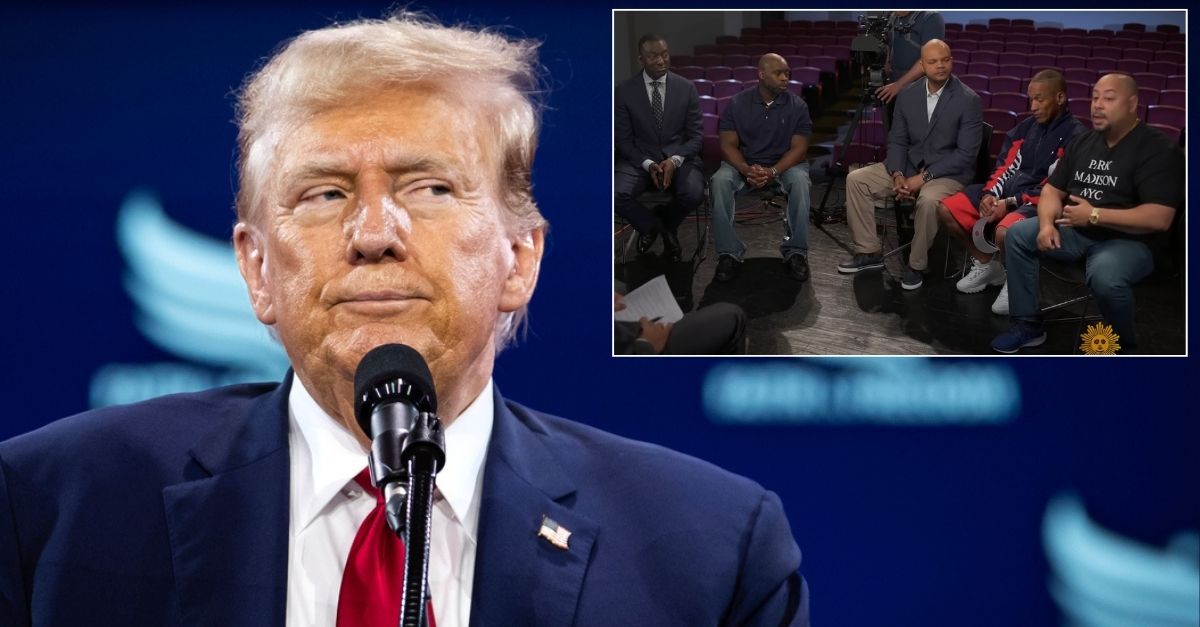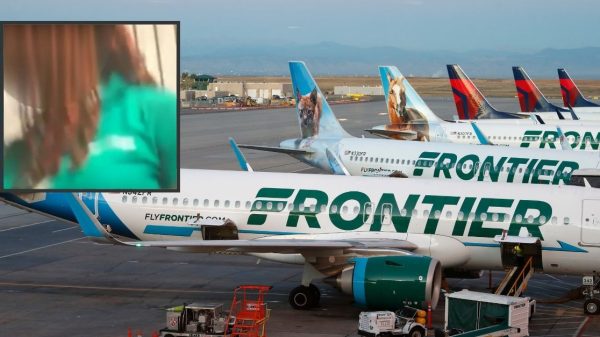
Inset, left to right: Yusef Salaam, Antron McCray, Korey Wise, Kevin Richardson, Raymond Santana (CBS Sunday Morning). Background: Donald Trump speaks at the annual Road to Majority conference in Washington, DC, June 22, 2024. (Allison Bailey/NurPhoto via AP)
Attorneys representing President-elect Donald Trump are seeking to get rid of the judge currently presiding over the defamation case brought against him by members of the Central Park Five over comments made about them during his lone presidential debate with Vice President Kamala Harris earlier this year.
Trump on Thursday evening filed a motion in the Eastern District of Pennsylvania requesting the “immediate recusal” of Senior U.S. District Judge Michael M. Baylson due to his “personal relationship” with Shanin Specter, the lead attorney representing Antron Brown, Kevin Richardson, Raymond Santana, Korey Wise and Yusef Salaam.
The basis for the recusal was a Nov. 13, letter Specter penned to Trump’s attorneys describing his relationship with Baylson and his family.
“Specifically, Mr. Specter stated that he has personally represented both the Honorable Michael M. Baylson and his wife,” the motion for recusal states. “Mr. Specter also stated that he has known and enjoyed a friendship with Judge Baylson since he was a child, and that both the Judge and his wife have been guests in Mr. Specter’s home on various occasions. The letter further stated that Mr. Specter and his wife have been guests in the home of the Judge and his wife.”
Due to the long-standing personal and professional relationship between the plaintiffs’ attorney and the judge, Trump argued that any reasonable person would have to “question the Court’s impartiality in this matter.”
The defamation action against Trump was initially filed on Oct. 21, 2024.
Trump’s comments
As Law&Crime previously reported, the plaintiff’s action stems from Trump’s comments during his debate with Harris, specifically, when he “falsely stated that Plaintiffs killed an individual and pled guilty to the crime,” according to the complaint.
During the Sept. 10 debate, Harris said that throughout his life and career, Trump has “attempted to use race to divide the American people.” One of the examples she provided was the “full-page ad” he placed in The New York Times and elsewhere in 1989 “calling for the execution of five young Black and Latino boys who were innocent — the Central Park Five — took out a full-page ad calling for their execution.”
In response to Harris, Trump said “they come up with things like what she just said going back many, many years when a lot of people including Mayor Bloomberg agreed with me on the Central Park Five.”
“They admitted — they said, they pled guilty. And I said, well, if they pled guilty they badly hurt a person, killed a person ultimately,” he said. “And if they pled guilty — then they pled we’re not guilty.”
These words, the complaint said, were “demonstrably false.”
“Plaintiffs never pled guilty to any crime and were subsequently cleared of all wrongdoing. Further, the victims of the Central Park assaults were not killed,” the lawsuit said.
The lawsuit alleged that Trump engaged in “malicious, intentional and reckless conduct” and should be on the hook for punitive damages to “punish Defendant Trump for his conduct and deter him and others similarly situated from like acts in the future.”
Trump’s prior exchange with a reporter during his presidency appears to have been cited as some proof that he knew the “Central Park Five” didn’t kill anyone or plead guilty, though he did say they “admitted their guilt.”
The backstory of the Central Park Five
In 1989, the then-teenagers were wrongfully accused of raping Trisha Meili as she jogged in Central Park. The five were also accused of attacking two men that same night.
“While in police custody, Plaintiffs were each separately subjected to hours of coercive interrogation, under duress, with no attorney present and often without a parent or guardian present,” the lawsuit recounted. “Plaintiffs all initially denied having any knowledge of the Central Park assaults. However, after hours of interrogation, four of the Plaintiffs agreed to provide written and videotaped statements in which they falsely admitted to having been present during the assaults.”
From there, the Central Park Five faced trials, maintained their innocence, were convicted by juries in 1990 and were sent to prison, only to be exonerated decades later after the real attacker, Matias Reyes, admitted to the crime against Meili and DNA “conclusively” proved that Reyes was the “true perpetrator,” court documents said.
“In fact, Plaintiffs were not involved in the assaults in any way, and their statements were the product of coercion and duress,” the lawsuit said. “Plaintiffs all recanted their coerced statements shortly after their interrogations.”
The Central Park Five were ultimately exonerated, their convictions were vacated, and New York City went on to settle a lawsuit for $41 million
Have a tip we should know? [email protected]

















































